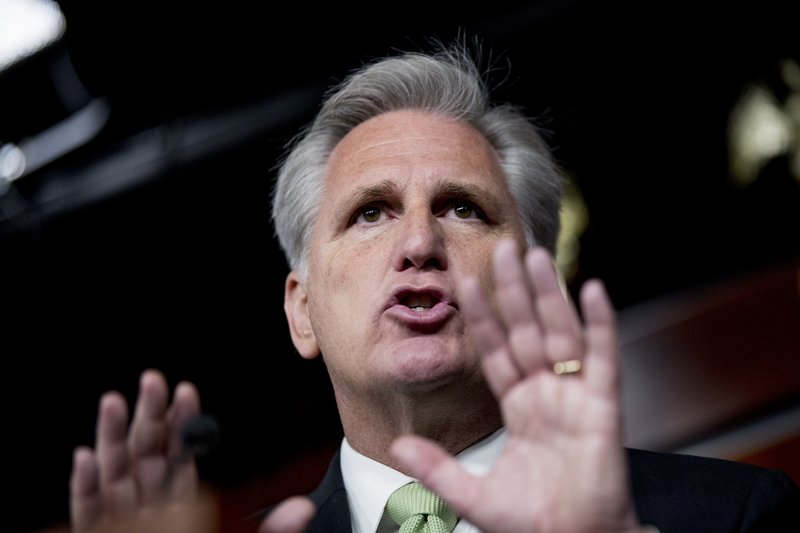WASHINGTON -- The Senate's top Republican issued a downbeat assessment of talks on a government spending bill Wednesday, warning that it will require a "laser focus from both parties and both chambers" to meet next week's deadline and avert a federal shutdown.
"To be frank, only a laser focus from both parties and both chambers on getting results will create a path to pass appropriations bills this year," Senate Majority Leader Mitch McConnell said. "There simply is not time left for my Democratic friends to continue haggling over ... poison pills, partisan policy riders and presidential transfer authorities."
Across the Capitol, the House on Wednesday passed its annual defense policy measure, which combined a $738 billion Pentagon price tag with legislation to provide federal employees with 12 weeks of paid parental leave.
The sweeping 377-48 vote followed weeks of arduous House-Senate negotiations that finally yielded a traditionally bipartisan measure, stripped of many add-ons sought by Democrats controlling the House.
The result came over outnumbered protests by some of the chamber's most liberal members, who said Democratic negotiators should have fought harder for House-passed liberal policies. They are also unhappy about the spiraling defense budget.
The compromise between the Democratic-controlled House and the GOP-held Senate broke free after Republicans agreed to accept a Democratic demand -- endorsed by President Donald Trump in end-stage negotiations -- for the landmark parental leave provision. Negotiators also endorsed Trump's call for a new Space Force -- a provision previously backed by the House on a bipartisan basis.
The annual defense policy bill has now passed for 59 years in a row, reflecting strong support among lawmakers for military personnel -- who would receive a 3.1% pay raise, the largest in a decade -- and the economic boost that military installations and defense contractors provide back home.
Trump has said he'll sign the measure, which is expected to pass the Senate next week at the latest.
Meanwhile, House Speaker Nancy Pelosi met with Hispanic lawmakers about the upcoming appropriations measure, which is likely to largely maintain Trump's tactical ability to fund his much-sought border wall.
It's part of an effort to solidify support for the emerging catchall funding bill, which promises to deliver plenty of small-bore victories for lawmakers in both parties and is seen as preferable to the alternative of simply keeping the government on autopilot.
California rivals Pelosi and Kevin McCarthy are feuding, this time about a long-shot McCarthy bid for additional funding for a controversial dam project that would provide more water for Central Valley farmers.
Nobody wants a government shutdown when a stopgap spending bill expires at the end of next week, but time is running out and it's not at all certain that negotiations can close in time for the Senate to process a year-end spending package. Another temporary funding bill, called a continuing resolution, could be needed to avert a repeat of last year's 35-day partial federal shutdown.
At issue is the almost one-third of the federal budget passed by Congress each year for day-to-day operations of federal agencies. This year's annual appropriations cycle was supposed to be relatively easy after this summer's budget and debt deal reversed a sharp set of spending cuts that would have otherwise struck both the Pentagon and domestic agencies.
But a Senate GOP move to more than triple a key border wall account to meet Trump's demands sparked a two-month stalemate. Negotiations are back on track, with most of Trump's $5 billion wall demand being returned to other domestic accounts.
It's complicated, but Trump has a significant tactical advantage that allows him to obtain several billion dollars for his border project. That's because he will refuse to sign any bill that denies his wall request outright or curtails his powers to transfer money from Pentagon accounts to border construction. Another option is to keep the Homeland Security Department budget largely frozen under a continuing resolution while maintaining those same transfer authorities that Trump has used to shift almost $7 billion to wall accounts even as Congress directly appropriates far less -- $1.4 billion for the 2019 budget year.
Congressional Hispanic Caucus Chairman Joaquin Castro, D-Texas, said the group "is concerned, as always, about increased funding for the wall or for more [Immigration and Customs Enforcement] detention beds."
House Democrats sought to block Trump's power to transfer Pentagon funding to the wall project, but his veto threats are likely to succeed in getting Democrats to drop the language in the private talks.
A Section on 12/12/2019

